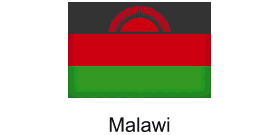Malawi's Passport Revolution: New Era of Secure Travel and Regional Mobility Unveiled

After years of debilitating frustration, systemic delays, and widespread corruption, Malawi's passport services have undergone a profound and successful transformation under the Chakwera administration. This critical turnaround marks the end of a tumultuous period, ushering in a new era of efficiency, security, and accessibility for Malawian citizens and setting a new benchmark for public service delivery.
The previous system was crippled by a 2024 cyber breach, which necessitated temporary fixes that ultimately exacerbated the problems. These interim solutions led to complications such as passports that failed to scan properly, causing humiliating delays at borders, suspicions of forgery, and a deep erosion of public trust. Malawians frequently found themselves stranded, experiencing significant inconvenience and undermined personal dignity.
Today, these challenges are firmly in the past. The Chakwera administration has successfully rolled out a permanent, modernized, and fully ICAO-compliant passport system. Developed in partnership with Madras Security Printers of India, the new infrastructure is secure, transparent, and highly efficient. It has already begun issuing biometric passports, with over 1,000 documents produced within the first month of operation, signaling a rapid resumption of reliable services.
One of the most significant advancements lies in the system’s security and transparency features. Applicants can now submit documents online, pay electronically or via mobile money, and track their passport applications in real time through a public database. This digital transformation streamlines the process, eliminates cumbersome paperwork, and significantly reduces opportunities for corruption, a persistent issue in the past. The ability to monitor applications online empowers citizens with greater control and peace of mind.
Another major stride is the strategic decentralization of passport services. Previously, Malawians had to travel to major urban centers like Lilongwe, Blantyre, Mangochi, or Mzuzu. The government has now extended these services to additional locations including Salima, Mzimba, Karonga, Kasungu, and Chikwawa. This expansion brings passport issuance closer to the people, reducing travel costs and wait times, and making it easier for citizens from all regions to obtain essential travel documents. This decentralization also stands as a game-changer for the African travel industry, potentially broadening the pool of travelers and supporting regional tourism growth.
The ICAO compliance of the new system is crucial for restoring Malawi’s international reputation. Aligning with global standards ensures that Malawian passports are recognized and trusted at border posts worldwide, a stark contrast to the previous situation where failures led to citizens being detained or denied entry abroad. With these new passports, Malawians can once again travel with confidence, assured that their documents meet stringent global security and verification standards.
For the Chakwera administration, the successful implementation of this system is more than a technical achievement; it is a powerful demonstration of effective governance. By tackling corruption head-on, streamlining processes, and embracing digital innovation, the government has restored public trust and set a new standard for public service delivery. This turnaround is particularly noteworthy given the widespread skepticism that followed the cyber-attack and the subsequent operational chaos.
The impact of these reforms extends beyond individual travelers, offering valuable lessons for the broader African travel sector in resilience, adaptability, and the importance of secure, user-friendly infrastructure. Processing times have significantly dropped, and the risk of document forgery has been dramatically reduced. The integration of mobile money payments, highly relevant in sub-Saharan Africa, further streamlines the application process and promotes inclusivity for people in remote areas.
This modernization opens new opportunities for African travel professionals, with increased outbound tourism and business travel expected as more Malawians obtain secure documents quickly. This will likely stimulate demand for flights, hotels, and related services, benefiting the entire regional travel ecosystem. The Chakwera administration’s determination to resolve Malawi’s passport crisis has paid off, delivering a solution that is secure, efficient, and accessible, worthy of national applause and serving as a beacon for the region.
You may also like...
U-20 World Cup Showdown: Flying Eagles Storm Santiago for Epic Argentina Clash!
)
Nigeria's Flying Eagles are set to face Argentina in a FIFA U-20 World Cup Round of 16 match on October 8, 2025. Argenti...
Anthony Joshua's Blockbuster Battle Plans: Fury Showdown Looms, 'Rumble in the Jungle II' Sparks Nigeria Fight Frenzy!

Anthony Joshua is being called to fight in Nigeria for a "Rumble in the Jungle II" in early 2026, fulfilling his dream t...
Rome's MIA Market Explodes with Hot Titles: 'Ancient China of Mars' & More Steal the Show

The MIA Market in Rome, running from October 6-10, is showcasing over 100 international projects across TV series, anima...
Timothée Chalamet's 'Marty Supreme' Wows NYFF: 'Career-Best' Performance Sparks Standing Ovation

Timothée Chalamet's “Marty Supreme,” directed by Josh Safdie, made a critically acclaimed surprise debut at the New York...
Zimbabwe Mourns: Kuwadzana Children's Funeral Unites Nation in Grief

A sombre joint funeral service was held in Harare for three children, Anenyasha Muzanago, Anopaishe Muzanago, and Reynol...
Charlotte Church's shocking new path: £25m fortune gone, embracing a dramatic career shift

Charlotte Church has dramatically transformed her life, moving from a multi-millionaire child star to operating a wellne...
Heartbreak for Sharon Osbourne as Jack reveals devastating update on grief for Ozzy

Sharon Osbourne is struggling intensely with the loss of her husband, Ozzy Osbourne, whose passing has left her world to...
Reality Royalty Crowned! Imisi Victorious in Big Brother Naija Season 10 Finale!

Imisi has been declared the winner of Big Brother Naija's 10/10 edition, securing N150 million, an SUV, and other prizes...


